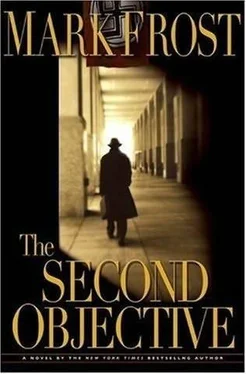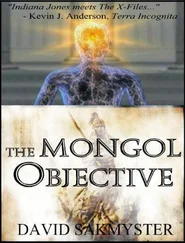The maid, sensitive to the major’s racism, mentioned that this valet was a man she had never seen in the hotel before, but not that he’d given her five dollars after she’d opened a room for him with her pass key. She failed to recall which room it was.
Grannit and Bernie pulled registration cards for every officer staying on the fourth floor. Five new arrivals had checked in that day, and Grannit called each room from the switchboard. Two of the men were in their rooms. Grannit identified himself and asked them to come down to the lobby for questioning. Three did not answer. Two of those room keys rested in their pigeonholes on the rack behind the desk, so those men were reasonably assumed to be out of the hotel.
One key was missing, room 417, registered to a Lieutenant Alan Pearson, who according to his card had checked in shortly after noon. One of the clerks behind the desk then remembered that Lieutenant Pearson had come back from lunch shortly thereafter looking the worse for wear from drink, in the company of another British officer who had asked for the key to 417 and then helped him upstairs.
“Who was this other man?”
A major, he thought. Pressed for details, the clerk recalled only that the major wore a black eye patch, although he couldn’t say for certain which eye it covered, and that was all he could remember about him.
“That’s exactly why he wore it,” said Grannit.
Seconds later, Grannit and Bernie were in the elevator, accompanied by the manager and the hotel’s chief of security.
Von Leinsdorf and Eddie Bennings walked back up the hill, heads down, collars raised against the cold as the freezing rain gave way to snow. Large, fragile flakes danced down in isolation. Von Leinsdorf stopped for a moment to look up at them.
Like the discharge from the smokestack of the crematorium.
“You all right, chief?” asked Eddie, looking back at him.
Von Leinsdorf had always prided himself on his ability to shut off memories of the camp, all the unwanted pieces of his past, partition them from his waking mind. Now they were punching through those walls with alarming frequency. He didn’t know what it signified, but it left him reeling.
“Yes, fine.”
They continued, turning the corner into the narrow covered entrance to their rooming house. Von Leinsdorf pulled Eddie back into the shadows against the wall of the building. Moments later, the two men Von Leinsdorf had earlier seen standing outside their building stepped forward. One of them held a handgun and barked at them in French.
“Speak English,” said Von Leinsdorf.
“Paris police. Put your hands against the building.”
Von Leinsdorf took a step forward, shoving his hands down into the pockets of his raincoat. “I’d like to see a badge first.”
The policeman took another step toward them. “Do as you are told.”
Eddie started to turn around, but Von Leinsdorf stopped him with his voice. “We’re not doing anything until we see a badge.”
The policeman seemed thwarted by his lack of respect. The pimp stepped forward with a snarl, unfolding a straight razor from his pocket.
“ Faites ce qu’il dit, chien! ” He took a few threatening steps toward Eddie. “ Vous ne payez pas, ainsi nous vous faisons! ”
“What the fuck is your problem?”
“He said you didn’t pay so he’s going to make you pay,” said Von Leinsdorf. “What’s he talking about?”
Eddie swallowed hard and blinked, but didn’t answer.
“Nobody move,” said a distinctly American voice. “Any of you.”
A man in a trench coat and hat stepped into view in the street just outside the passage behind Von Leinsdorf, holding with both hands a Colt.45 and a flashlight lined up against its barrel. The gendarme turned toward the newcomer, irritated.
“This is a police matter,” said the gendarme.
The man swung the flashlight onto the gendarme. “Put your gun down on the ground and we’ll talk about it.”
“Who the hell are you?”
“Military police.”
“Good news,” said Von Leinsdorf, pulling a badge from his pocket. “So are we. Criminal Investigation Division.”
Eddie’s head swiveled back and forth, trying to keep up.
The officer pointed his light on Von Leinsdorf and the badge he was holding. “Toss that over here. The rest of you put your weapons on the ground and kick them toward me. Right now.”
Von Leinsdorf threw the badge toward the feet of the MP. The gendarme and the pimp laid the gun and razor on the ground and kicked them in his direction.
“Get down on your hands and knees,” he said.
The Frenchmen obeyed. Before he picked up Von Leinsdorf’s badge, the MP slid his light over onto Eddie Bennings.
“Who the hell are you?” he asked.
“I’m with him,” said Bennings, pointing to Von Leinsdorf.
“A cooperative witness helping with our investigation,” said Von Leinsdorf. “I’ve got his ID right here. These guys are cops, like they said, and they’re dirty as hell.”
“That is what we are doing,” said the gendarme, pointing at Von Leinsdorf. “ They are deserters, black marketers-”
Bennings glanced down and saw Von Leinsdorf pulling the pistol from his pocket, and a moment later the narrow corridor erupted in gunfire.
At five minutes to eight, the hotel’s chief of security knocked on the door to room 417. He identified himself and announced to Lieutenant Alan Pearson that he had an urgent message for him from SHAEF headquarters. Grannit stood to the left side of the door with his pistol drawn. Bernie Oster and the hotel manager waited just down the hall. The door Bernie stood directly in front of opened, and he came face-to-face with a woman on her way out. She looked at his MP gear in alarm, and he saw an officer getting dressed in the room behind her. Bernie held his finger to his lips and she quietly closed the door.
When Pearson failed to answer, the chief of security inserted his pass key with trembling hands and pushed open the door. Grannit pushed ahead of him into the room. Alan Pearson lay in bed, under a blanket pulled up to the chin, his face turned away from the door. Grannit felt for a carotid pulse and then yanked the covers away. Pearson’s body had been stripped to his underwear. From the way blood had pooled in the body Grannit knew the man had been dead for at least five hours. He called the others inside, then examined Pearson’s arms.
“He was here,” said Grannit to Bernie, then turned to the manager. “Call Inspector Massou at the Prefecture of Police.”
“I know him,” said the manager, grateful for a reason to leave.
“He killed him with an injection,” said Grannit, pointing out a wound on the inside of Pearson’s arm.
Out of the corner of his eye Grannit saw the chief of security about to open an armoire at the foot of the bed. He spotted a piece of fabric sticking out of a gap at the bottom of the armoire door.
“Don’t touch that!”
Grannit crossed to him and examined the door carefully. He opened it a crack and looked down its length, then turned to Bernie.
“Flashlight.”
Bernie handed him the flashlight off his belt. Grannit used the beam to illuminate a line of monofilament stretched taut across the opening, then traced it down along the door to the bottom of the armoire, where it connected to the pin of a hand grenade, taped onto a small square pat of dark gray plastic explosive resting on the tunic of the uniform that had been inserted under the door.
“He left something for us,” said Grannit. “Call the bomb squad.”
When he saw the grenade, the hotel’s chief of security turned pale and backed out the door. A moment later they heard him running down the hall outside. Grannit gently closed the door to the armoire and held it there. He looked over at Bernie.
Читать дальше












